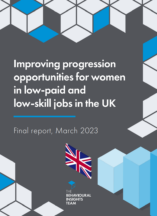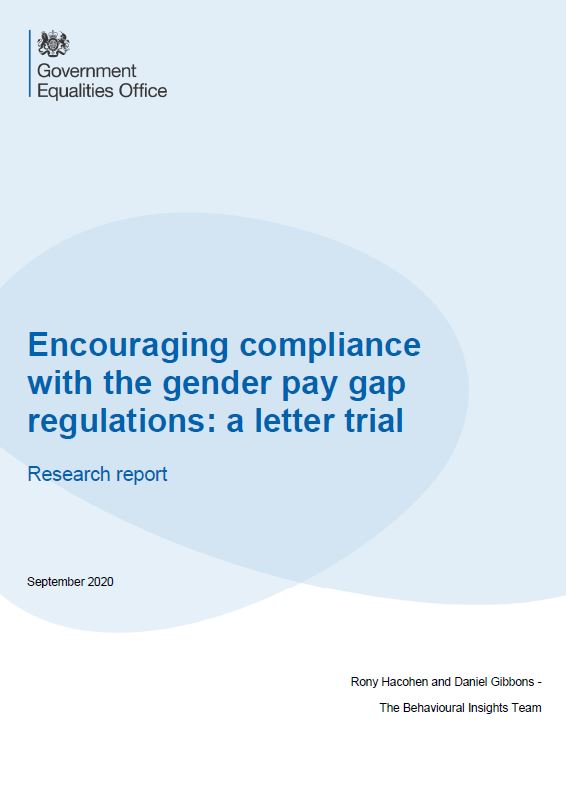This report presents the findings of a research programme on the barriers faced by women in low-paid and low-skill work in the UK, alongside potential solutions. The research, conducted by the Behavioural Insights Team (BIT), was part of a global research programme focused on the UK, France, Spain, and South Africa. Our work included a review of existing literature, a survey of 2,002 low-paid workers, 6 in-depth interviews with low-paid women, and a co-design workshop that brought together employers and research organisations.
Below is a summary of the barriers we uncovered alongside interventions with the greatest potential.
Job-related barriers to progression
Flexibility and predictability: Flexible working arrangements are particularly important for women, as they are disproportionately responsible for unpaid work such as childcare and household work. This burden can be especially challenging for low-paid women, who may be less able to afford formal childcare. Predictability is often overlooked; for the low-paid women we surveyed, unpredictable hours were the second most important barrier after a long/expensive commute.
- Default jobs to be advertised with flexible working options: Set a default that all jobs must be advertised with flexible working options available.
- Shift swapping & scheduling: Advance scheduling to improve predictability and technologically-enabled shift swapping to allow workers to swap shifts with other workers without requiring manager approval.
Safety: Harassment and stereotyping in some male-dominated environments can isolate women and act as a barrier to progression. The cleanliness of the working environment is also important. One low-paid woman we interviewed stated: “Sometimes [when cleaning] I can find drugs and I don’t want to be touching that”
- Safety checks or reviews of an organisation by an external reviewer: External reviews of an organisation can help women to know in advance whether a location is safe and may encourage the organisation to improve if it scores poorly.
Job security: Low-paid roles are more likely to be precarious. Agency work can mean workers are disconnected from the company they work for and therefore have fewer progression routes available.
Organisational processes: Recruitment and progression practices can unintentionally provide greater opportunities for men than for women.
- Default employees into applying for promotions: Where employees have demonstrated that they are ready for promotion against set criteria, they are automatically put forward in the next promotion cycle, without having to apply or be nominated.
- Increasing transparency in recruitment decision-making: Reducing bias in the selection process.
- Listing experience on CVs in terms of years, not dates: presenting previous roles on a CV in terms of years of experience rather than chronological dates.
Commutes: Long and/or expensive commutes were the top-selected barrier by low-paid women we surveyed. Women may favour roles with a smaller commute over higher-paying roles in order to be closer to home to carry out domestic responsibilities. They are also more likely to encounter safety issues when commuting.
Personal barriers to progression
Financial stress: Women in low-paid roles often have to manage financial stress, which gets in the way of progression opportunities. Low-paid work is often associated with irregular hours which equates to irregular pay. For the low-paid women we surveyed, reduced stress about current finances was the top selected factor that both women and men thought would help them prepare for progression at work.
- Increasing pay frequency: Splitting pay into smaller and more frequent payments, for example, paying fortnightly rather than monthly.
- Take-home pay transparency: Providing greater clarity to employees about the amount they would expect to earn if they were to work all their allotted shifts in the upcoming pay period.
Skills: The evidence on the effectiveness of training is mixed, however, the low-paid women we surveyed expressed a desire for more technical training. Access to training is also an issue, with some evidence of gender imbalance.
- Improve workplace training: Improving both the training itself and access to training.
Domestic responsibilities: Women carry out, on average, 60% more unpaid work than men. Childbirth extends the pay gap between women and men. There is currently very low uptake of parental leave by eligible fathers, likely due to perceived gender and social norms. Child-related financial support can be difficult to access.
- Increase men’s uptake of parental leave: Encouraging men to take longer parental leave by tackling the perception that other male colleagues would disapprove, by providing information to men.
- Improve access to child-related financial support: Providing further information to people on how to access child-related financial support.
We welcome the opportunity to collaborate with employers and research organisations to:
|








